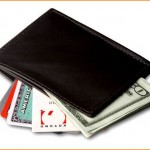Don’t Leave Home Without It!
Cancer navigation consultant and social worker Kathy Gurland was working in a hospital emergency room when medics brought in a young man who suffered a heart attack.
Unfortunately, the patient died. He had a wallet with a driver’s license and business cards but no emergency contact. It took Gurland more than five hours to find a relative to deliver the tragic news.
Gurland writes about this dilemma in her latest column for Women’s Magazine. Gurland’s is a regulator contributor to the publication from CancerConnect.com, an online network for people living with cancer and their caregivers.
Gurland, MSW, LCSW, said most people think a driver’s license is all they need to be identified in case they become incapacitated. However, just putting a card with a handwritten emergency contact in your wallet or on the back of your cellphone will make it easier for caregivers to find loved ones, said Gurland, who is also a National Association of Social Workers member.
“When you take the time to ensure that your emergency contact person’s information is readily available, you are protecting yourself, keeping strangers from making uninformed personal decisions for you, and sparing your loved ones from dealing with burdensome dilemmas,” she wrote.
Cheers to Women’s Magazine for making Gurland a regular contributor!
To learn more about how social workers such as Kathy Gurland help clients overcome health issues visit NASW’s “Help Starts Here” Health and Wellness Website by clicking here.
| Leave A Comment
Advertisement
5 Comments
Leave a Comment
You must be logged in to post a comment.





Do you find that putting info in your cellphone under ICE…(In case of emergency) is helpful or is a written card better?
Most states now have a donor information space on the back of the DL. In my state there is a place for 2 witnesses to sign: my DPoA #1 & 2 have signed and have their phone numbers listed there.
Keeping such data on your cell phone is also a good idea.
But here’s a separate point to consider. (I worked in trauma centers for over 20 years) We have people brought to the ER from car wrecks all the time with no identification: usually women. Guys usually have a billfold in their pants pocket. Women? You have your purse in the car: and who knows where it was thrown in the collision. As an ER social worker it was a matter of routine to meet the paramedics on the deck to collect as much information as possible to help identify the injured: which car was she in, were there other passengers in that car? what hospital were they taken to? was she awake at the scene, did the paramedics think to pick up her purse, what law enforcement jurisdiction is investigating the accident? ( so that they might retrieve the purse & ID) Such notifications are difficult. When unnecessarily delayed they can be much more difficult.
I now teach full time in a BSW program. I ask my students (mostly in their 20’s, if they have filled out an advance directive, if they’ve talked about such issues with their loved ones and if they have officially designated a durable power of attorney for health care decisions. None of these actions costs a dime, but in a time of crisis their value is immeasurable. Gary Bachman MSSW
Gary,
Great points you made! Wish I had more space in my column as I would have liked to have addressed your points as well. However, the magazine does limit my word count 😉 which for a SW/columnist is a good idea since we SW always have a LOT to say about topics we feel strongly about.
Loretta, I do mention ICE and other solutions for making your information accessible to first responders in the full article including suggestions for joggers, hikers, etc who carry nothing with them when they’re engaged in their activities.
Thanks for your responses,
Kathy Gurland, LCSW
What if you have no one to designate as an emergency contact?
John,
You can still complete an advance health care directive and give a copy of it to any medical provider you may seek care from. If you have a primary care physician, I would encorage you to discuss the details with them. If you have insurance, you might consider contacting the insurance companies “case management” office for guidance. You might also consider contacting a hopital social worker for guidance. Most hopitals and provider networks now have (an increasingly standardized) policy as to how advance directives are to be retained and identified in the medical record. Such directives have a prominent place in our increasingly “digital” medical records.
I guess another option, one I’ve actually seen done, is to tatoo your wishes directly on you chest. It’s not nearly as dramatic but I’ve seen “medic alert” bracelets that reference advance directive wishes as well.